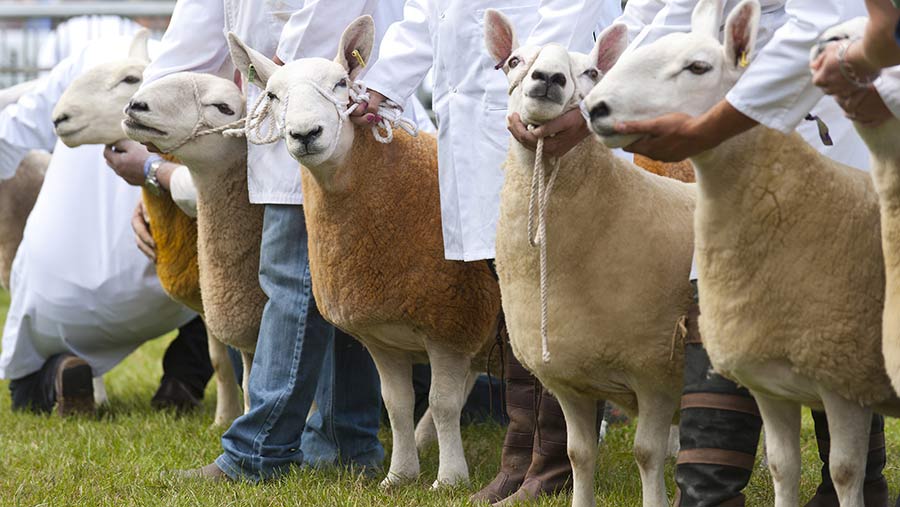Slurry storage and Brexit to be hot topics at Royal Welsh
 © Graham M. Lawrence/LNP/REX/Shutterstock
© Graham M. Lawrence/LNP/REX/Shutterstock Welsh farmers are expecting greater clarity on what Brexit will mean for their markets and an announcement on capital grants for slurry storage when they gather for the Royal Welsh Show later this month.
With the Welsh government on course to publish its Brexit paper on 10 July, the content of this document and its implications for Welsh farming are expected to be hot topics for discussion at the four-day show at Llanelwedd, Powys, from July 23-26.
Brexit dominated the political agenda at the 2017 event and that is certain to be the case again.
See also: 5 things England can learn from Wales on farm policy
CLA Cymru director Rebecca Williams said the mid- to long-term outlook for Welsh farming always came under the spotlight at the show, but that view was now obscured by what she described as the “looming shadow” of the likely impact of Brexit on markets and supply chains.
Royal Welsh Show in numbers
- More than 200,000 visitors expected
- 3,141 horses
- 843 cattle
- 3,027 sheep
- 76 goats
- 154 pigs
Beyond that, CLA Cymru will use the event – Europe’s largest agricultural festival – to call for “joined-up thinking’’ in developing Wales’s rural economy.
“Critical components are the planning system, business support, regional funding and how we nurture our growing tourism sector. They’re not just side issues, they hit at the core of our rural economy,” Ms Williams insisted.
‘Little progress’ on Brexit
The Farmers’ Union of Wales will also concentrate on Brexit, with its president, Glyn Roberts, suggesting that little progress has been made since the 2017 show.
“Few would have guessed that with less than nine months to go until we exit the EU, answers would be just as thin on the ground as they were last year and uncertainties more common than ever,” he said.
Aside from Brexit, it will host seminars on rural crime, mental health and mobile phone coverage.
How to find out more and get tickets
Reduced price e-tickets are available online at www.rwas.wales where there are further details about parking, details of the events and activities taking place over the four days, and other useful information.
NFU Cymru will also host a series of seminars on its lobbying priorities, with topics including Brexit, fairness in the dairy supply chain and developing Wales’s red meat market.
“The union will host a large number of meetings with politicians from both Cardiff Bay and Westminster, stakeholders, suppliers, retailers, processors and others from the supply chain,” said president John Davies.
Livestock entries up
As ever, a big draw ofr the show is the livestock, and this year entries are up in most sections – there will be 7,241 animals competing in the show rings.
The four-legged contenders won’t be the only sights to occupy the show rings – the King’s Troop, Royal Horse Artillery, with its First World War “thirteen pounder” state saluting guns, will be in action in the main ring.
In the air, the centenary of the RAF will be marked with a show from the RAF Parachute Display Teams.
Decision expected on slurry storage grants
An announcement on capital grants for slurry storage and other on-farm nutrient management infrastructure is expected at the Royal Welsh Show, following pressure from farming unions.
Last December, the Welsh government stopped short of introducing a blanket approach to Nitrate Vulnerable Zone (NVZ) designation, opting instead to work with partners to achieve a balance of “regulatory measures, voluntary initiatives and investment” to tackle water quality issues.
Key to this could be the re-introduction of Sustainable Production Grants (SPGs) which offer 40% funding for a range of capital investments and which would focus on multiple water quality improvements in the next application window – but this is reliant on permission from the European Commission and the Nitrates Directive.
There has not been an application window for SPGs since 2016. There were three rounds of funding totalling £13.5m, but only 79 applications were approved because each window was significantly over-subscribed.
Rachel Lewis-Davies, NFU Cymru’s environment and land use adviser, said the environmental benefits of investment in slurry, manure and silage storage, the covering of yards and clean and dirty water separation were clear.
She believes farmers should be actively supported through the SPG framework to make such investments. But she added: “Any grant scheme must be well resourced and easy to apply for.”
The Wales Land Management Forum sub-group on agri-pollution – a body incorporating Natural Resources Wales, the Welsh government, farming unions and others which was established to develop ways of tackling pollution – submitted a progress report to Lesley Griffiths, the Welsh government’s cabinet secretary for environment and rural affairs, on 5 April.
A Welsh government spokesperson said Ms Griffiths was “carefully considering” those recommendations and that these would be used to inform the government’s approach to tackling agricultural pollution.
Elsewhere on the showground, farmers will be able to access advice at the Farming Connect stand on securing funding through the Farming Connect Advisory Service for managing and storing slurry and farmyard manure, as well as soil and nutrient management planning.
